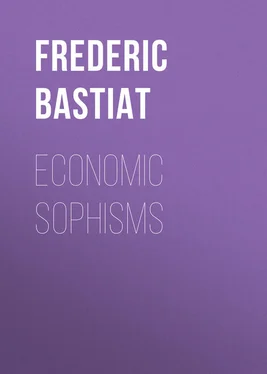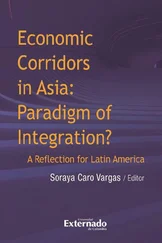Frederic Bastiat - Economic Sophisms
Здесь есть возможность читать онлайн «Frederic Bastiat - Economic Sophisms» — ознакомительный отрывок электронной книги совершенно бесплатно, а после прочтения отрывка купить полную версию. В некоторых случаях можно слушать аудио, скачать через торрент в формате fb2 и присутствует краткое содержание. ISBN: , Жанр: foreign_antique, foreign_prose, на английском языке. Описание произведения, (предисловие) а так же отзывы посетителей доступны на портале библиотеки ЛибКат.
- Название:Economic Sophisms
- Автор:
- Жанр:
- Год:неизвестен
- ISBN:http://www.gutenberg.org/ebooks/44145
- Рейтинг книги:3 / 5. Голосов: 1
-
Избранное:Добавить в избранное
- Отзывы:
-
Ваша оценка:
- 60
- 1
- 2
- 3
- 4
- 5
Economic Sophisms: краткое содержание, описание и аннотация
Предлагаем к чтению аннотацию, описание, краткое содержание или предисловие (зависит от того, что написал сам автор книги «Economic Sophisms»). Если вы не нашли необходимую информацию о книге — напишите в комментариях, мы постараемся отыскать её.
Economic Sophisms — читать онлайн ознакомительный отрывок
Ниже представлен текст книги, разбитый по страницам. Система сохранения места последней прочитанной страницы, позволяет с удобством читать онлайн бесплатно книгу «Economic Sophisms», без необходимости каждый раз заново искать на чём Вы остановились. Поставьте закладку, и сможете в любой момент перейти на страницу, на которой закончили чтение.
Интервал:
Закладка:
But abundance of money means that we must have plenty of it to buy everything else. Then in A, to the real dearness which arises from a very active demand, there is added a nominal dearness , which is due to a redundancy of the precious metals.
Scarcity of money means that little is required for each purchase. Then in B a nominal cheapness comes to be combined with real cheapness .
In these circumstances, industry will have all sorts of motives – motives, if I may say so, carried to the highest degree of intensity – to desert A and establish itself in B.
Or, to come nearer what would actually take place under such circumstances, we may affirm that sudden displacements being so repugnant to the nature of industry, such a transfer would not have been so long delayed, but that from the beginning, under the free regime , it would have gradually and progressively shared and distributed itself between A and B, according to the laws of supply and demand – that is to say, according to the laws of justice and utility.
And when I assert that if it were possible for industry to concentrate itself upon one point, that very circumstance would set in motion an irresistible decentralizing force, I indulge in no idle hypothesis.
Let us listen to what was said by a manufacturer in addressing the Manchester Chamber of Commerce (I omit the figures by which he supported his demonstration): —
"Formerly we exported stuffs; then that exportation gave place to that of yams, which are the raw material of stuffs; then to that of machines, which are the instruments for producing yarn; afterwards to the exportation of the capital with which we construct our machines; finally, to that of our workmen and our industrial skill, which are the source of our capital. All these elements of labour, one after the other, are set to work wherever they find the most advantageous opening, wherever the expense of living is cheaper and the necessaries of life are moat easily procured; and at the present day, in Prussia, in Austria, in Saxony, in Switzerland, in Italy, we see manufactures on an immense scale founded and supported by English capital, worked by English operatives, and directed by English engineers."
You see very clearly, then, that nature, or rather that Providence, more wise, more far-seeing than your narrow and rigid theory supposes, has not ordered this concentration of industry, this monopoly of all advantages upon which you found your reasoning as upon a fact which is unalterable and without remedy. Nature has provided, by means as simple as they are infallible, that there should be dispersion, diffusion, solidarity, simultaneous progress; all constituting a state of things which your restrictive laws paralyze as much as they can; for the tendency of such laws is, by isolating communities, to render the diversity of condition much more marked, to prevent equalization, hinder fusion, neutralize countervailing circumstances, and segregate nations, whether in their superiority or in their inferiority of condition.
III. In the third place, to contend that by a protective duty you equalize the conditions of production, is to give currency to an error by a deceptive form of speech. It is not true that an import duty equalizes the conditions of production. These remain, after the imposition of the duty, the same as they were before. At most, all that such a duty equalizes are the conditions of sale . It may be said, perhaps, that I am playing upon words, but I throw back the accusation. It is for my opponents to show that production and sale are synonymous terms; and if they cannot do this, I am warranted in fastening upon them the reproach, if not of playing on words, at least of mixing them up and confusing them.
To illustrate what I mean by an example: I suppose some Parisian speculators to devote themselves to the production of oranges. They know that the oranges of Portugal can be sold in Paris for a penny apiece, whilst they, on account of the frames and hot-houses which the colder climate would render necessary, could not sell them for less than a shilling as a remunerative price. They demand that Portuguese oranges should have a duty of elevenpence imposed upon them. By means of this duty, they say, the conditions af production will be equalized; and the Chamber, giving effect, as it always does, to such reasoning, inserts in the tariff a duty of elevenpence upon every foreign orange.
Now, I maintain that the conditions of production are in nowise changed. The law has made no change on the heat of the sun of Lisbon, or on the frequency and intensity of the frosts of Paris. The ripening of oranges will continue to go on naturally on the banks of the Tagus, and artificially on the banks of the Seine – that is to say, much more human labour will be required in the one country than in the other. The conditions of sale are what have been equalized. The Portuguese must now sell us their oranges at a shilling, elevenpence of which goes to pay the tax. That tax will be paid, it is evident, by the French consumer. And look at the whimsical result. Upon each Portuguese orange consumed, the country will lose nothing, for the extra elevenpence charged to the consumer will be paid into the treasury. This will cause displacement, but not loss. But upon each French orange consumed there will be a loss of elevenpence, or nearly so, for the purchaser will certainly lose that sum, and the seller as certainly will not gain it, seeing that by the hypothesis he will only have received the cost price. I leave it to the protectionists to draw the inference.
IV. If I have dwelt upon this distinction between the conditions of production and the conditions of sale, a distinction which the protectionists will no doubt pronounce paradoxical, it is because it leads me to inflict on them another, and a much stranger, paradox, which is this: Would you equalize effectually the conditions of production, leave exchange free.
Now, really, it will be said, this is too much; you must be making game of us. Well, then, were it only for curiosity, I entreat the gentlemen protectionists to follow me on to the conclusion of my argument. It will not be long. I revert to my former illustration.
Let us suppose for a moment that the average daily wage which a Frenchman earns is equal to a shilling, and it follows incontestably that to produce directly an orange in France, a day's work, or its equivalent, is required; while to produce the value of a Portuguese orange, only a twelfth part of that day's labour would be necessary; which means exactly this, that the sun does at Lisbon what human labour does at Paris. Now, is it not very evident that if I can produce an orange, or, what comes to the same thing, the means of purchasing one, with a twelfth part of a day's labour, I am placed, with respect to this production, under exactly the same conditions as the Portuguese producer himself, excepting the carriage, which must be at my expense. It is certain, then, that liberty equalizes the conditions of production direct or indirect, as far as they can be equalized, since it leaves no other difference, but the inevitable one arising from the expense of transport.
I add, that liberty equalizes also the conditions of enjoyment, of satisfaction, of consumption, with which the protectionists never concern themselves, and which are yet the essential consideration, consumption being the end and object of all our industrial efforts. In virtue of free trade, we enjoy the sun of Portugal like the Portuguese themselves. The inhabitants of Havre and the citizens of London are put in possession, and on the same conditions, of all the mineral resources which nature has bestowed on Newcastle.
V. Gentlemen protectionists, you find me in a paradoxical humour; and I am disposed to go further still. I say, and I sincerely think, that if two countries are placed under unequal conditions of production, it is that one of the two which is least favoured by nature which has most to gain by free trade . To prove this, I must depart a little from the usual form of such a work as this. I shall do so nevertheless, first of all, because the entire question lies there, and also because it will afford me an opportunity of explaining an economic law of the highest importance, and which, if rightly understood, appears to me to be fitted to bring back to the science all those sects who, in our day, seek in the land of chimeras that social harmony which they fail to discover in nature. I refer to the law of consumption, which it is perhaps to be regretted that the majority of economists have neglected.
Читать дальшеИнтервал:
Закладка:
Похожие книги на «Economic Sophisms»
Представляем Вашему вниманию похожие книги на «Economic Sophisms» списком для выбора. Мы отобрали схожую по названию и смыслу литературу в надежде предоставить читателям больше вариантов отыскать новые, интересные, ещё непрочитанные произведения.
Обсуждение, отзывы о книге «Economic Sophisms» и просто собственные мнения читателей. Оставьте ваши комментарии, напишите, что Вы думаете о произведении, его смысле или главных героях. Укажите что конкретно понравилось, а что нет, и почему Вы так считаете.












